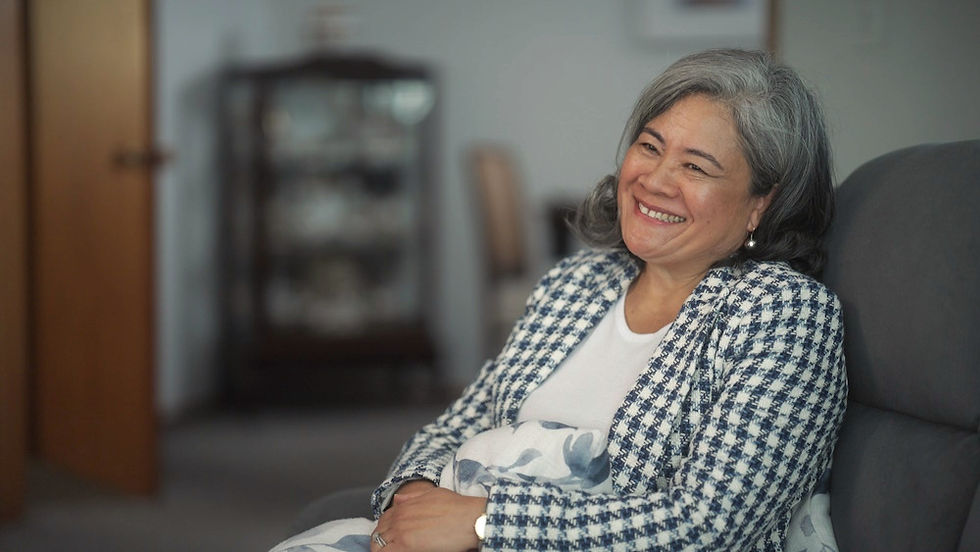Sharlene
- admin1356
- Oct 10, 2024
- 3 min read
Updated: Nov 26, 2024
"I was in a state of shock because we’re still young. We still have a young family."

The Unseen Struggle: Caring for a Loved One with Early-Onset Dementia
When Tevita Havea was diagnosed with early-onset dementia at just 57, his family was forced to confront a reality that few are prepared for. Early-onset dementia, a condition not widely recognized or understood, presents unique challenges that many families, including the Haveas, must navigate with little guidance or support.
Sharlene Havea, Tevita’s wife and primary caregiver, recalls the moment she first noticed something was wrong. As they prepared for their son Justin’s graduation, Tevita seemed unusually tired, forgetful, and disinterested in tasks he once handled with ease. The final confirmation came when Tevita, a trained lawyer, struggled to handle legal documents during a property purchase, ultimately handing them over to Sharlene. “That was a shock to me,” Sharlene remembers. “That was so not him.”
After Tevita’s diagnosis, Sharlene found herself thrust into the role of a caregiver—a role she never expected to take on so soon. “I was in a state of shock,” Sharlene reflects. “Especially because he's still young. We’re still young as a couple. We still have a young family.”
The diagnosis brought profound changes to their lives. Tevita, once vibrant and engaged, became increasingly withdrawn and emotional. Sharlene often found him in tears, mourning the loss of his independence and grappling with the knowledge that he could no longer be the man he once was. Their sons, faced with the reality of their father’s illness, had to step up in ways they never expected. Justin worked two jobs, while Takefumi balanced university studies with work to support the family.
In New Zealand, where support for families dealing with early-onset dementia is limited, the Haveas felt largely alone. “There’s so little help available for families like ours,” Sharlene says. “We had to figure things out on our own, often feeling isolated and overwhelmed.”
Despite the challenges, there was a moment of light. A surprising opportunity arose when Tevita participated in a television show focused on cooking. The kitchen, a place of creativity and precision, became a new arena where Tevita could rediscover joy. “Since he joined the show, Tevita’s really opened up and is so much happier,” says Sharlene. “He's more chatty, and happy. His mood has changed to being happy, and he comes home with this new purpose in his life. He keeps me on my toes, making sure his clothes are ready, and he loves talking about what they did in the kitchen.”
However, the public exposure brought mixed reactions. While one son supported Tevita’s decision to participate, the other hesitated, concerned about the public revelation of his father’s condition. “One of our sons didn’t agree with Tevita being in the show,” Sharlene recalls. “He just wasn’t ready for everybody to know that Tevita has dementia.”
This concern was rooted in the traditional beliefs of their Tongan community, where dementia might be seen as a curse or a source of shame. However, Sharlene and Tevita were determined to dispel such misconceptions, believing it was important to acknowledge and address the reality of dementia openly. “I’m not even ashamed of Tevita having dementia,” Sharlene asserts. “It’s important that people know, especially for Tevita’s well-being.”

Sharlene’s story highlights the urgent need for more support for families dealing with early-onset dementia in New Zealand. Caregivers like her are often left to shoulder the burden alone, without the resources or community support that is desperately needed. “This journey is not just about the person with dementia; it’s about the entire family and the impact it has on all of us,” Sharlene emphasizes.
The Haveas continue to navigate this difficult path with resilience and love, but their story underscores the broader need for systemic change. Early-onset dementia is not just a personal battle; it’s a societal challenge that requires greater awareness, support, and action to ensure that no family has to face this journey alone.
YOUR DONATION will HELP US HELP OURSELVES.
Getting help needed is a living challenge for the group behind Young Onset Dementia Collective.
If we wait for Government, Ministry of Health or under-funded agencies, it will be too little too late for our people.
For many the situation is dire. Help is needed NOW so we made a collective conscious decision to do everything we can to help ourselves. Spouses, partners, carers of people living with younger onset dementia have real life reasons driving combined determination.
Help us keep minds engaged and spirits lifted for those affected. Plus support carers in their financial, mental and wellbeing journey.





